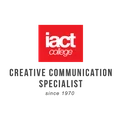
For over 30 years, IACT College has been about preparing students for the creative industry through their well-known diplomas. In the last decade it broadened the options to studying degree with programmes from the United Kingdom with University of Sunderland. Today they also operate as an agent to assist students transfer their credit to selected universities in the UK, Australia and New Zealand. We asked a few members of the academics to describe what makes both, teaching and learning creative communication at IACT College a step above the rest.

“What’s unique is the way we deliver our material. We use Project-Based Learning (PBL) as a method for our students. Students are assigned real-life projects, many of which come from our industry partners. Be it a marketing or brand development project, or an integrated advertising/marketing communications campaign, or a PR campaign, or a video production, or a journalism feature, or a market study of a contemporary and current issue, they are all real life projects. Guided by their lecturers and industry mentors, our students gain valuable in-depth knowledge and practical experience of their subject, while learning the value of teamwork and collective problem solving. All in all, these real-life projects more than prepare our students for the real world of communications.”

“To be successful in Public Relations, one must be well-read and always ready to learn. Students study PR like they study law: through practice, practice, practice.” She adds, “The key is to expose and access yourself to information about the world, from politics, business, sports, entertainment, technology, tourism and hospitality, anything that makes the world today and how it has evolved. Students are taught to develop good research skills. We don’t just focus on the theoretical aspects of Public Relations but very much on real time issues. Students are engaged with the industry at almost all levels of PR thought such as crisis management, publicity and media relations, and PR strategies. To sum it up, students graduate with a sound knowledge based on 2.5 years of industry engagement, case studies, sharing session by industry experts as well as independent learning.”

“Studying at IACT College, you get to learn in detail about the art and science that go into broadcasting and digital filmmaking, both in front and behind the camera. The course is designed with a holistic approach which combines theoretical knowledge, practical skills, critical thinking and analytical skills, as well as ethical and social skills. It also integrates a deep understanding of the subject matter with the development of key skills and competencies needed to adapt in a rapidly changing, dynamic, and competitive global marketplace.” In describing the average broadcasting classroom, Tan says, “Student numbers in the broadcasting classes are kept small so as to ensure better learning from the lecturers. Practical hands-on assignments projects as well as real-life industry clients’ projects throughout the course provide students ample time handling with the equipment as well as understand and mastering the process of production.

At IACT College, we train our graphic design students to be strong visual communicators – able to bridge ideas and messages whilst communicating with the market through the use of great designs. The faculty encourages students to join industry competitions that they may understand the latest trends in the industry! We believe they learn better when their works are being critiqued by judges and other great creative thinkers. We prioritize industry relevance in the delivery of our lectures and that is why our graduates are always job ready and in high demand.
As for the rest of the academic team, Chan summarizes with the following, “On the average 83% of our lecturers have an average of 12 years working experience in relevant communication and marketing fields. This industry experience is passed on to students in terms of high industry standards, knowledge of current trends and relevant advertising issues and problems. To graduate, our students must complete a mandatory 12 week industry attachment known as internship with a relevant industry player; be it an advertising agency, media house or marketing company. All these add to their skills and they gain invaluable experience from the real world of the creative industry. Students then have the opportunity to apply their knowledge and skills to execute the project and solve problems which are bound to arise in such projects. Working in teams our students get to experience real-life work situations. They arrive at the conclusions and produce their finished projects to a standard which often exceeds industry standards.”
This article was published in The Star Newspaper on 16 March 2017
 +60142521561
+60142521561







